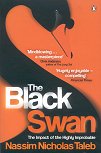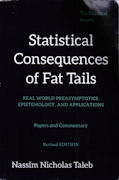This is a highly entertaining and informative rant against those who
try to plan and predict by denying the possibility of improbable
high-consequence events. Taleb's main thesis is that it is impossible
to be absolutely sure that something like "all swans are white"
is true (no matter how many white swans you have seen), but
devastatingly easy to be absolutely sure that it is false (exhibit
just a single black swan). In particular, the fact that financial
markets and other risk takers haven't had problems in the past doesn't
prove that their risk strategy is sound, but a single financial
collapse can demonstrate its frailties. Moreover, even to have a
statistical degree of confidence in such statements we need a
lot more evidence than we think we do, especially when the
probability distributions have "fat tails", rather than
Gaussian exponential decays. And even worse are the "unknown
unknowns", those "black swans" of the title, the events
from left field that we never even considered in our risk
calculations, which take us completely by surprise -- but which are
much more common than we might like to think.
He backs up his argument with data, anecdotes, and illustrative
fictional tales, all in a very persuasive manner. He has a compelling
little example of the difference between Gaussian and fat tailed
probabilities: as you get older, your expected date of death draws
nearer (life expectancies are Gaussian), but as a project becomes more
and more overrun, its expected completion date gets even further
away (a property of "fat tailed" power law distributions).
I like his emphasis that most people concentrate too much on what
they know, rather than learning more about what they don't know --
that is, seeking confirmatory rather than refuting evidence for their
theories and models. Part of the reason I like this is personal: he
starts off with a tale of a library:
p1.
a private library is not an ego-boosting
appendage but a research tool. Read books are far less valuable than
unread ones. The library should contain as much of what you do not
know as your financial means, mortgage rates, and the currently
tight real-estate market allow you to put there. You will accumulate
more knowledge and more books as you grow older, and the growing
number of unread books on the shelves will look at you menacingly.
Indeed, the more you know, the larger the rows of unread books.
This makes me feel so much better about my own
unread library. Nevertheless, they are
still looking at me menacingly.
He also claims that history only occurs in retrospect -- it is so
much easier to explain the past, when we can pick and choose the
evidence, than to predict the future, when we have no idea what is
important and what isn't. Events just don't make the kind of
historical sense that we impose on them. He exhorts us to read
people's diaries, rather than their post hoc histories, to see
this. Taleb himself claims not to make specific predictions, because
by their very nature his kind of Black Swans are unpredictable.
However, the following words, written in 2006, published in 2007, are
eerily prescient as we today sit surrounded by global financial
meltdown...
pp225-6.
Financial institutions have been merging
into a smaller number of very large banks. Almost all banks are now
interrelated. ... when one falls, they all fall.* The increased
concentration among banks seems to have the effect of making financial
crisis less likely, but when they happen they are more global in scale
and hit us very hard. We have moved from a diversified ecology of
small banks, with varied lending policies, to a more homogeneous
framework of firms that all resemble one another. True, we now have
fewer failures, but when they occur . . . I shiver at the thought.
... The electricity blackout
experienced in the northeastern United States during August 2003, with
its consequential mayhem, is a perfect example of what could take
place if one of the big banks went under today.
* ... the
government-sponsored institution Fanny Mae, when I look at their
risks, seems to be sitting on a barrel of dynamite ...
Taleb has been promulgating his brand of market economics for some
time now. He disapproves mightily of the theoretical economists who
base their models on patently false assumptions, who win Nobel Prizes
for them, and who lose billions of dollars when they apply them in the
real world. Clearly, he has experienced some hostility in return, but
this doesn't faze him:
p280.
An ad hominem attack against an
intellectual, not against an idea, is highly flattering. It indicates
that the person does not have anything intelligent to say about your
message.
This is a marvellous book, a fun read, and a sobering read. If his
assertions about how wrong the markets theorists are, and how long
this has been known to be the case (and
he is not alone in this
opinion), then the current situation of global financial meltdown is
at best due to criminal incompetence.





